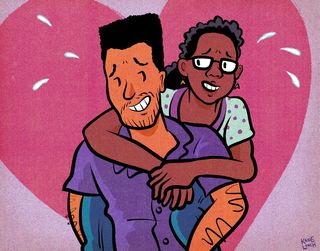Relationships
The Enabling Romantic Relationship: An Unhealthy Alliance
Is your romantic relationship mutually dependent and enabling?
Posted February 9, 2020 Reviewed by Lybi Ma

People sometimes ask me how to tell the difference between a couple that’s close and one that’s codependent. To me, the difference lies in partner equity in giving and receiving.
In healthy relationships, there’s an equitable balance of giving and receiving. Partners are close. Both partners’ needs for love, care, and support are met. No one partner carries the weight of the relationship or the weight of their shared adult life. Their lives are intertwined, but individuality is retained. There’s a high level of trust, where both partners can rely on each other for help and care. They support each other emotionally, sharing and listening.
The dependent romantic relationship is a different kind of partnership. There’s a person in the “taker role” who’s under-functioning, immature, addicted, entitled, personality disordered, selfish, or troubled, or some combination of these. They rely on their partner to cater to them, to assume or soften the negative consequences for their actions, and/or to compensate for their under-functioning. Some have narcissistic and manipulative qualities. Meanwhile, the partner in the “codependent giver role” is usually an empathic, forgiving, competent, and helpful person. They consistently play the role of sacrificing caregiver, rescuer, supporter, or confidante. They often believe that with enough love and support, they can “fix” their loved one and help them realize their potential, but in fact, they usually end up enabling them.*
Powered by love and commitment, and by a partner more comfortable with giving, and another more comfortable with taking, dependent romantic relationships can work for a while. But eventually, the giver becomes frustrated, hurt, resentful and burned out (or some combination of those things). They feel angry, disrespected, and stuck, and they sometimes become controlling to get their partner to improve. Conflicts and relationship dissatisfaction are likely as time goes on.
If you’re wondering if you’re in such a romantic relationship consider these 10 diagnostic questions:
1. Am I consistently the main “grown-up” in the relationship that assumes most, or all, of the adult responsibilities when the other person is technically capable of contributing more?
2. Do I regularly have to fix problems resulting from their irresponsibility, immaturity, or anti-social behavior?
3. Is it common for me to make excuses for them and to look the other way when they violate agreements or treat me or others poorly?
4. Despite my sacrifices and best efforts to love and support them, does their immaturity, addiction, poor mental or physical health, incompetence, or irresponsibility remain largely unchanged?
5. Do they seem content with our imbalanced relationship and with me carrying the load?
6. Am I feeling like it’s almost always about them and rarely about me, even when I’m clearly overburdened or stressed?
7. In my efforts to be there for them, have I sacrificed other important relationships, my physical or mental health, my happiness, my finances, or my career or personal development?
8. Am I starting to feel taken advantage of and resentful about the sacrifices I’ve made for this person?
9. Am I largely meeting my partners’ needs for care and consideration while they rarely meet mine?
10. Are friends and loved ones expressing concern about my imbalanced relationship and how much I’m sacrificing for my romantic partner?
If you suspect you’re in an enabling romantic relationship, I can offer a few suggestions. I’d first try being more assertive about what you need and what you’re willing to live with, and to set boundaries around what you are willing to do for them. Counseling, friends, family, or a support group may help with this. But it’s hard to change an entrenched relationship pattern and you may need couples counseling to help you and your partner figure out how to create a healthier relationship.
Depending on who your partner is, they may resist or refuse relationship changes, or they may not be able to change. Then you’ll have to decide whether to stay or leave. (No judgment here if you decide to stay, unless of course, your staying harms children. I recognize the power of commitment and that the costs of leaving may be significant.). Counseling, friends, family, or a support group may help you make that decision, and provide the support you need whether you stay, or whether you go.
References
* For more information, see: “Unhealthy Helping: Overcoming Codependence, Enabling, and Other Dysfunctional Helping.”


